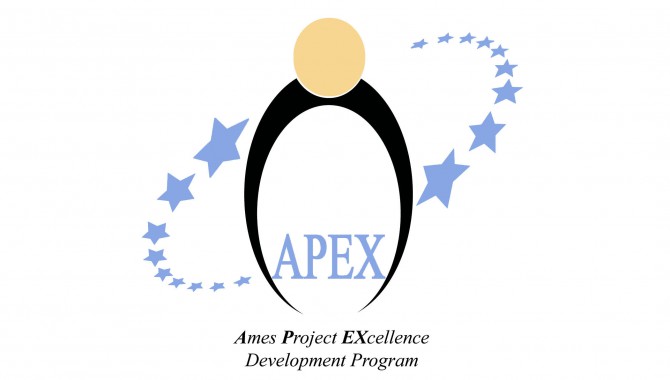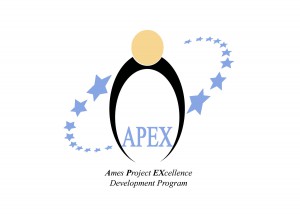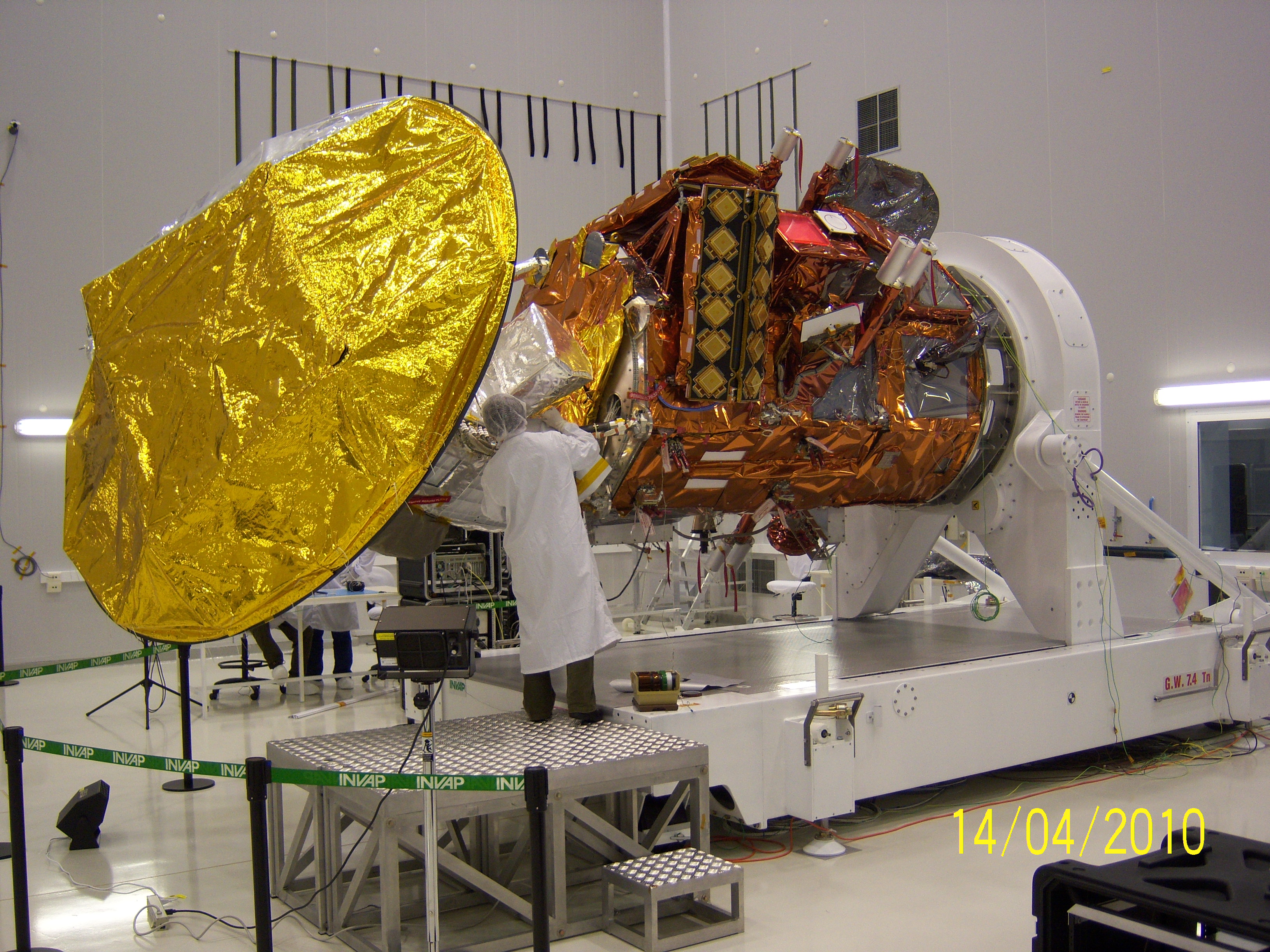
By Matthew Kohut
“Every manager has the same complaint, regardless of his or her level,” says Dr. Jeffrey McCandless, strategic advisor for the Human Systems Integration Division at Ames Research Center. “We all say it all the time: ‘My subordinates don’t understand the big picture, and they don’t understand all the relationships that I, the manager, need to build.’”
As one of the first graduates of the Ames Project Excellence (APEX) development program, McCandless has been trying to keep his eye on the big picture. He was one of twenty participants selected to go through the pilot year of APEX, a professional development program for project managers and systems engineers. “APEX gave me a much broader perspective about the center,” he says. “I realized that I have to make sure I don’t just focus on my own division here.”
Pete Zell, another member of the APEX class of 2006, found a different kind of focus in the program. “APEX allows you to turn down the volume and concentrate on improving key project management skills more deeply,” he says. Zell, deputy project manager for the Crew Exploration Vehicle Thermal Protection System, found that APEX meshed perfectly with his day job: “I didn’t have to go out and search for things to try and improve my skills on—I had it all sitting in front of me. The fact that I was on a large, multicenter project gave me plenty of opportunities to apply the skills to my work.”
Real-world applicability was precisely the intention of the program’s creators. “APEX is designed and driven to help people do what they’re supposed to be doing right now, and do it better. We consider their project work one big OJT [on-the-job-training] assignment,” says APEX Program Manager Claire Smith. Smith and Ron Johnson, chief of the Systems Management Office at Ames, were the driving forces behind APEX. “The process is designed so that development happens in a continuous loop,” Johnson explains. “Experiences and knowledge are generated via project work. Those experiences are discussed and reflected upon in the mentoring sessions, and then those new insights and sharpened awareness are taken back to the project work.”
 In addition to on-the-job training, the program includes mentoring, coursework, and coaching provided through the Academy of Program/Project and Engineering Leadership. The first task of each participant is to conduct a self-assessment and determine a skill level—developmental, functional, or proficient—in twenty-six core competencies for project management or systems engineering. APEX integrates each participant’s competency ratings with the needs that Ames center management has identified for competencies in its project managers. Participants then choose three or four competencies to concentrate on for the year and design an individual development plan (IDP) to attain the next level of capability in each.
In addition to on-the-job training, the program includes mentoring, coursework, and coaching provided through the Academy of Program/Project and Engineering Leadership. The first task of each participant is to conduct a self-assessment and determine a skill level—developmental, functional, or proficient—in twenty-six core competencies for project management or systems engineering. APEX integrates each participant’s competency ratings with the needs that Ames center management has identified for competencies in its project managers. Participants then choose three or four competencies to concentrate on for the year and design an individual development plan (IDP) to attain the next level of capability in each.
“The thing I found manageable about the program was that it didn’t try to do everything. It didn’t try to improve you across the entire spectrum, which would’ve been overwhelming,” Zell says. He chose budget and full-cost accounting, requirements development, scheduling and work breakdown structure development, and risk management as the four areas in which he would like to improve his skills during the year. “I could pick something that I needed to do anyway. By doing that, it helped me focus within my project, which was valuable, and it gave me constant feedback.”
McCandless focused on NASA procedures, project planning and scheduling, and project control. “After [learning more about] NPR 7120.5D, I have a better understanding of the four key steps of a project’s development from the beginning all the way through to evaluation. I’ve been around long enough to see that some projects have failed because some of these pointers in 7120.5 haven’t been met or done. By seeing them in black and white in front of me, it drives that home so I remember it for the next project.”
A key component of APEX is mentoring. Each participant has four to six hours per month of one-on-one mentoring with a senior-level person in the field. Additionally, monthly team mentoring sessions were held with their cohort of project managers or systems engineers and led by recognized experts who facilitated topical discussions. “The mentoring program had to be at least semi-structured,” Smith says. “People getting together to shoot the breeze is not mentoring.”
For McCandless, both forms of mentoring proved valuable. “What helped was a combination of talking to my own mentor and the sessions with the group mentor,” he says. “The group mentoring lined up really well with my IDP goals for project control and project scheduling. He [the group mentor] would make recommendations and give tips and relate them to his own experience.” McCandless’s personal mentor deepened his appreciation for project success at the center: “He had good pragmatic insight into what strategies were effective here at Ames, and which projects were succeeding and which were failing, and why.”
Zell found it easy to connect on a personal level with his mentor. “We hit it off in terms of our philosophies of project management,” he says. “We basically spent a lot of time talking about common experiences.”
The multidimensional design of the APEX program is the result of an extensive research and development effort dating back nearly a decade. “In the late 1990s and early 2000, we were pretty successful at getting new research and technology projects here at the center,” Johnson says, “and we had a lack of critical mass of project managers. We were taking people who were primarily researchers and putting them in the position of managing projects.” Smith and Johnson held a series of workshops across the center during 2000 and 2001 to gather feedback about how to address this issue.
When they briefed the center’s senior management on their findings, one of the top recommendations was to establish a project manager development program at Ames. At that point, they cast a wide net for ideas and information. “We did centerwide needs assessment, we did focus groups, we did surveys,” Smith says. “We came up with a proposal for what a program would look like, tying in what we knew about the Academy of Program/ Project Leadership (now the Academy for Program/Project and Engineering Leadership, or APPEL), what we’ve seen at other centers, what other centers have tried. We were always checking to make sure our program mapped to APPEL. We also looked at the PMI [Project Management Institute] model, INCOSE [International Council on Systems Engineering], CMMI [Capability Maturity Model Integration], you name it.”
“We had a lot of conversations with the Jet Propulsion Lab and Goddard,” Johnson adds. “We saw those centers as models for what Ames was aspiring to be in terms of a center for managing space flight missions.”
Their research confirmed what they already knew—that strong practitioner involvement would be critical to their program design process. “APEX is for the practitioner by the practitioner,” Smith says. “They have to be a part of designing it. Otherwise there’s no way we could design a program that meets their needs.”
At the same time that they worked at the grassroots level, they also solicited feedback from the center’s senior management. “We recognized that in order for anything to succeed here, we needed to have a champion at the center management level,” Johnson said. “You have to have champions, and you have to listen to what the senior managers are saying. They have their own ideas.”
In the case of APEX, one of those ideas fundamentally reshaped the program. “When we originally started, it was a project management development program,” Johnson says, “but in our meeting with our center director, he said, ‘Project management is important, but we also need to strengthen our systems engineering.’ So we basically added that component to the program based on what he wanted.”
Following the pilot year graduation, Johnson and Smith conducted a “lessons noted process,” and they are now applying these insights to the next iteration of APEX. “We call them ‘lessons noted’ because insights only become ‘lessons learned’ when we apply them and change the way we do things,” says Smith. As a second cohort progresses through the program, she believes that the Ames community as a whole has a better idea of what APEX can become as it matures: “I think the idea of [what constitutes] a development program is a lot more conscious, and there’s a lot more consensus around it.”







